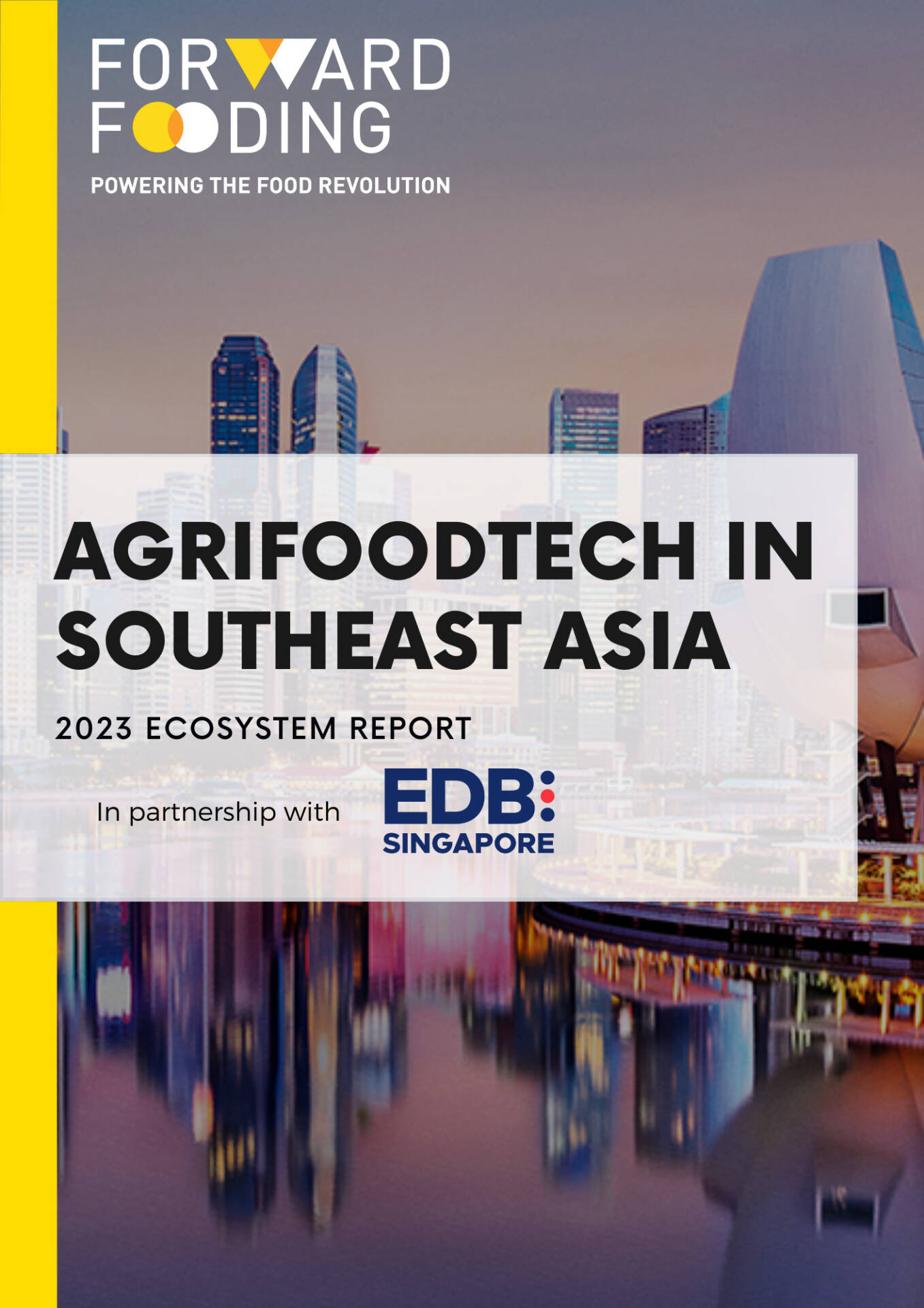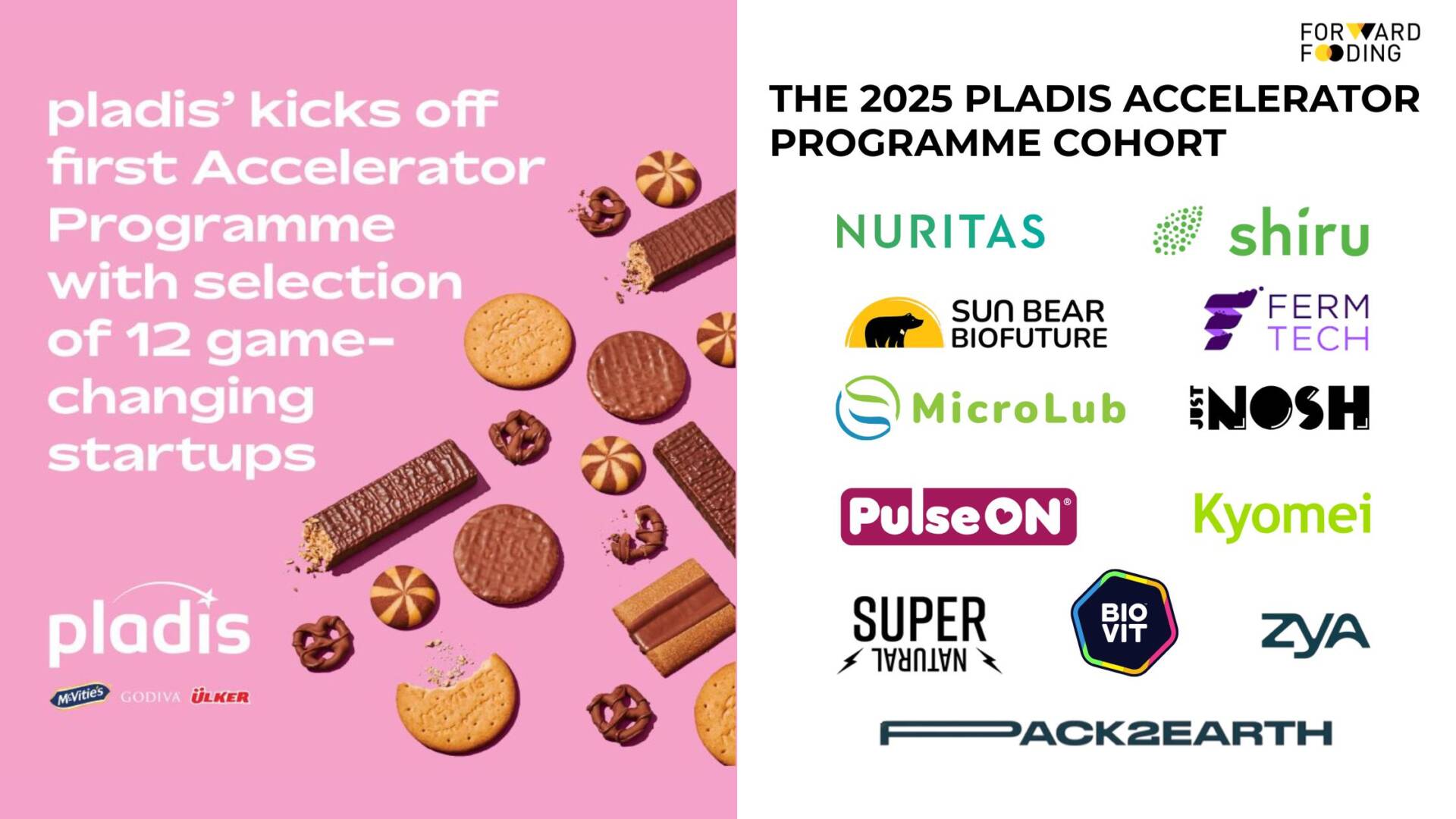FORWARD FOODING
THE BLOG
Rising despite the challenges: inspiring Women and Minority founders in the AgriFoodTech sector
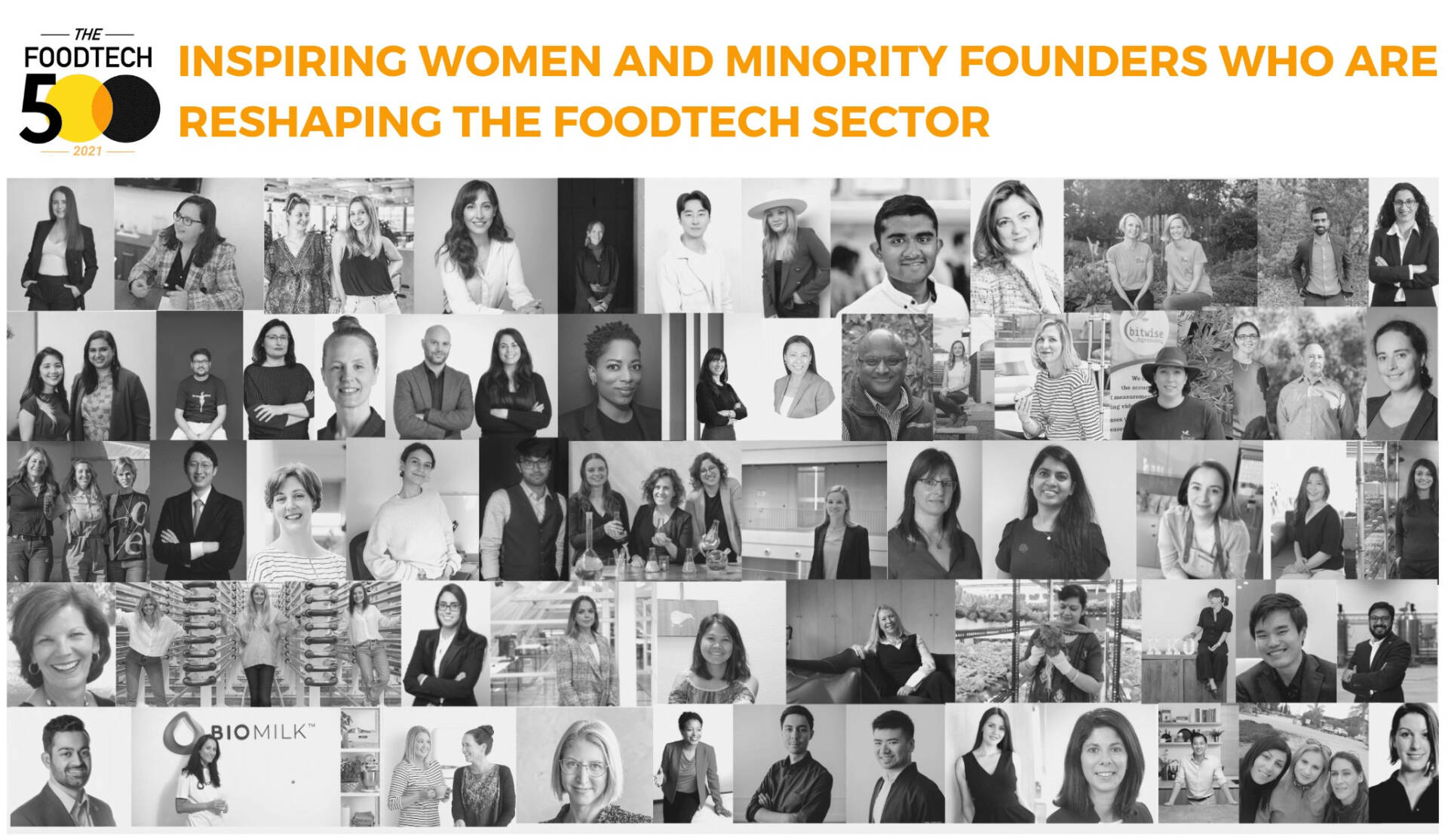
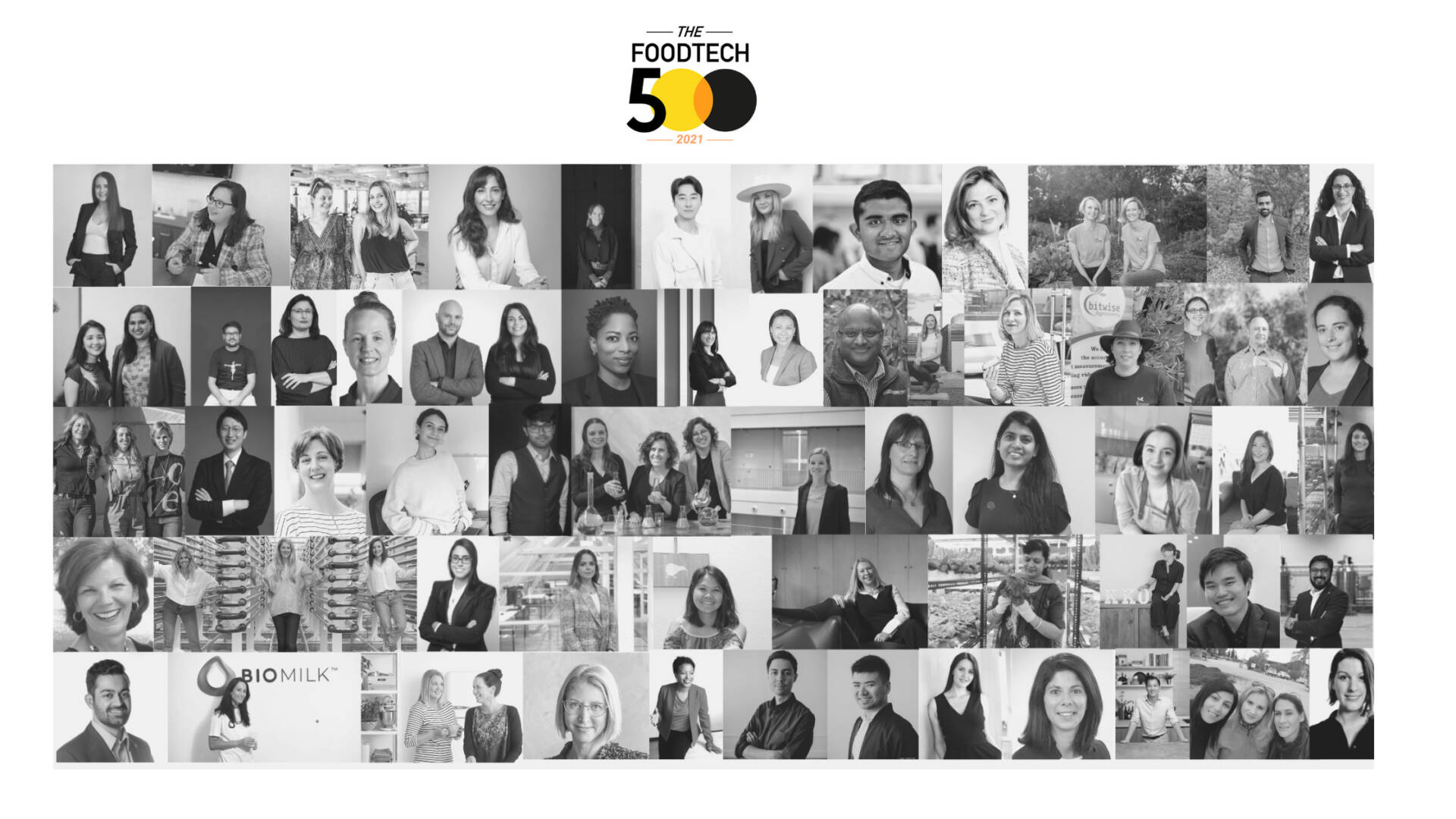
AgriFoodTech has already proved to be one of the most environmentally and socially sustainable startup sectors. While exploring how technology can be leveraged to improve efficiency and sustainability in designing, producing, choosing, delivering & enjoying food (according to our own definition), AgriFoodTech is considered, as reported by Climate Tech VC, the first choice for investors who want to tackle the climate crisis or are just taking their first steps in ESG deals.
However, as per the rest of the startup space, it still lags behind in terms of diversity.
Indeed, the representation of women and people from ethnic or other minorities in founders’ teams is scarce and when present, they face notable obstacles, starting from fundraising. As reported by TechCrunch, data from 2019 shows that less than 3% of total VC investments went to women-led companies, despite them representing 28% of total founders. In addition, the category was disproportionately impacted by the economic consequences of the COVID-19 pandemic. According to Pitchbook, in 2020 venture capital investments in female-founded companies in the US fell by 3%, even with an overall increase of 16.2% in startup investments in the country.
Despite facing more challenges, diverse companies often achieve remarkable results. For instance, according to research from the Boston Consulting Group, women-funded startups are able to generate 78 cents for each dollar of funding while their male-founded counterparts generate 31 cents per dollar, less than half of that.
As the FoodTech 500 provides a snapshot of the global AgriFoodTech sector, we had a look at the stats about where the 500 listed startups and scale-ups stand in terms of diversity and representation.
Let’s dive in.
DIVERSITY IS THE ANSWER
For the purposes of this analysis, a diverse startup or scaleup in our methodology must have at least a founder belonging to one of four underrepresented groups: female founders, black, asian or minority ethnic founders, LGBTQ+ founders, founders with disability. Here is their distribution across the FoodTech 500 list.
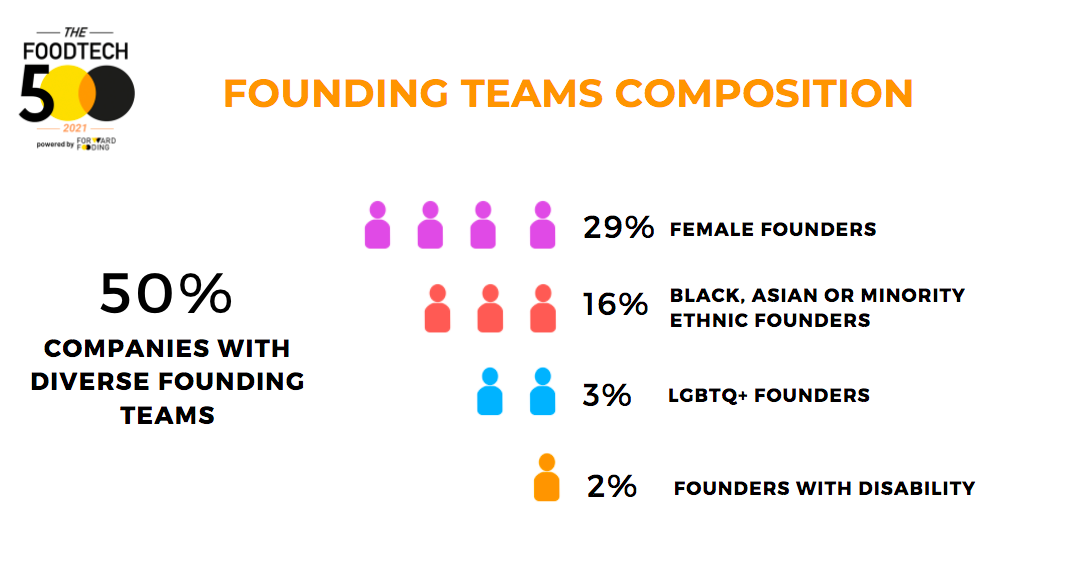
To simplify, we will from now on divide the diverse companies category into two groups: Women-led and Minority-led (which will be including the remaining three subgroups). Building on the experience of past editions of the FoodTech 500, we were able to compare the 2020 and 2021 batches to pinpoint relevant trends. Between the data of these two years, we saw the increased participation of diverse companies that we were hoping to find, across most of the indicators.
The average sustainability score of the category saw an increase of 4% from 2020 to 2021. In the group, women-led companies show the most interesting data points: first, they made a significant jump in increasing their average sustainability score, with a 7% increase from 2020 to 2021. Furthermore, on average women-led companies increased their employee’s headcount in 2021 compared to the 2020 edition. This positive sign shows that despite the challenges posed by the COVID-19 pandemic, women-led companies grew in the past two years. Some notable examples include CropX, The Vurger Co. and Nourished, which jumped from the 20-50 employees class in 2020 to the 50-100 employees class in 2021.
The 3 main sectors of activity remain Next-Gen Food & Drinks, Agtech and Surplus & Waste Management while the most represented countries are United States, United Kingdom, Israel and Spain, perfectly in line with the total of the FoodTech 500 list (you can find more info on our FoodTech 500 White Paper). Indeed, it does not come as a surprise that the presence of female and minority AgriFoodTech entrepreneurs is more common in countries with already well-established ecosystems, active actors and knowledge-sharing initiatives.
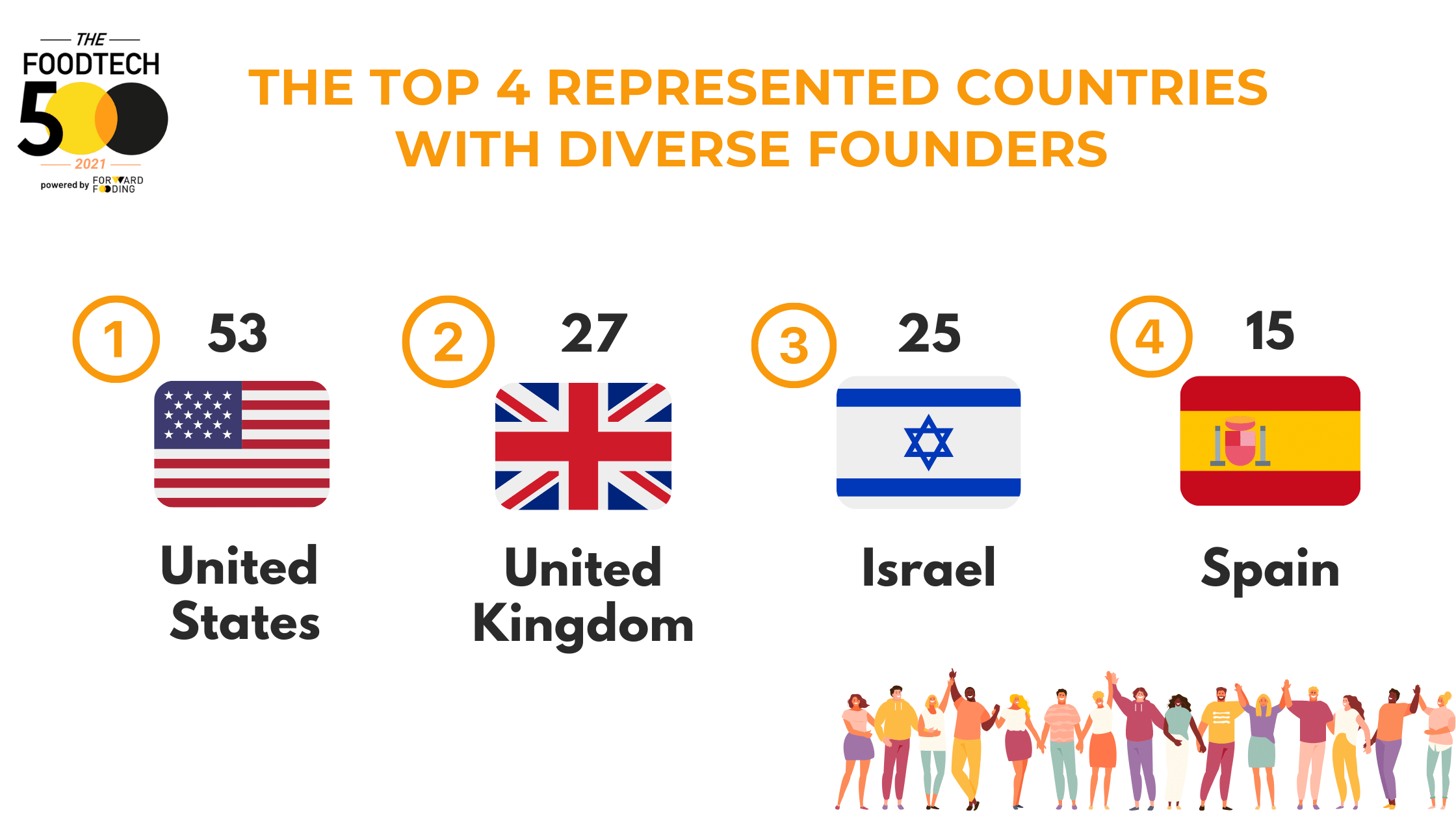
THIS YEAR, DIVERSE STARTUPS TOOK A HUGE LEAP FORWARD IN FUNDRAISING
The real interesting data point we found relates to funding raised. Indeed the diversity category made a huge jump from 2020 to 2021, climbing from €659.22M of capital raised in 2020 to €1.1B the following year.
A huge part of this raise in capital can be attributed to three of our FoodTech 500 Top 10 companies, namely female-founded companies Too Good To Go, Infarm and Pivot Bio, which has have a minority founder. The three companies cumulatively raised approximately €1B in total funding, of which €645M in 2021 alone.
TOP 10 2021 FoodTech 500 Diverse Companies
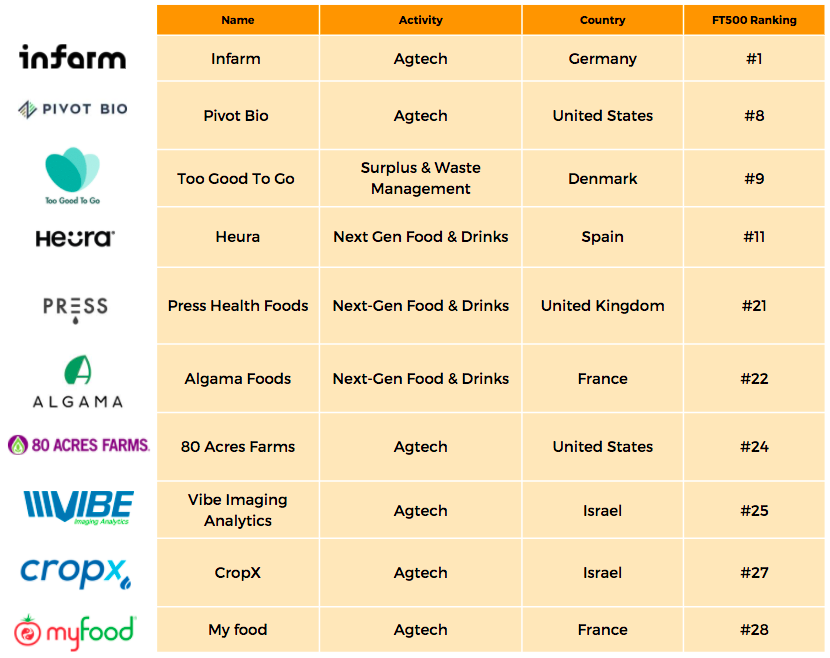
However, even with these outliers, the diversity batch still lags behind in terms of funding. Indeed, despite the fact that these companies represent 50% of the FoodTech 500 list, the amount of funding they raised was only 39% of total capital.
Unfortunately, this data is in line with the research on funding gaps for female-led and minority-led companies. According to research from Boston Consulting Group, women business owners pitching for early-stage capital to investors, receive significantly less than men, with a disparity that averages more than $1 million.
TechCrunch also reported that in 2019 women-led companies only obtained less than half the average deal size of their male-founded counterparts. Belonging to a racial or ethnic minority also represents a disadvantage when raising capital. For instance, in 2020 only $1 of the $150 billion raised by companies in the US went to African American startups (Crunchbase).
The reasons behind this gap are multiple, starting from the lack of diversity in VC, which is still generally considered a “boys’ club” (Axios). Indeed, according to the Harvard Business Review, only 12% of decision-makers in VC firms are women and it is rare to find female partners, too. One of the consequences is that VC decisions are affected by biases, which for instance take the form of women and men being asked different questions in panel interviews (Harvard Business Review).
This imbalance became even more visible during the COVID-19 pandemic. For the sake of quantifying this phenomenon, investments in female-only founding teams reached an all-time peak of 3.4% of VC dollars in 2019 just to fall to 2.4% in 2020 (Chicago Booth Review). 2021 did not witness any improvements as, despite a general increase in startup investments, in its first 8 months companies with solely female founders only raised 2.2% of total VC funding (Crunchbase).
ARE THEY TACKLING SDGS AND ACHIEVING IPOS AND UNICORN STATUS?
The most tackled Sustainable Development Goals by diverse companies are Goal 2 – Zero Hunger, Goal 3 – Good Health and Well Being and Goal 12 – Responsible Consumption and Production. The data is perfectly in line with the rest of the FoodTech 500 batch, which we thoroughly analysed in our “How the 2021 FoodTech 500 companies advance the Sustainable Development Goals agenda” blogpost.
In addition, we noticed that 74% of all companies tackling SDG 5 – Gender Equality have teams composed of diverse founders. Specifically, 53% of them are female-founded companies, which can be intended as an indicator that diverse companies tend to be more sensitive to gender issues.
Last but not least, they are also represented among FoodTech 500 IPO companies and Unicorns. Indeed, half of the IPO’ed companies in the batch have diverse founders’ teams: 4 of them are women-founded and come from Israel while a company with a minority founder comes from the United States. The ratio is less impressive for the FoodTech 500 unicorns and the Top 10, respectively with 2 out of 7 and 3 out of 10 of them being founded by a woman or a person from an ethnic minority.
Here’s an infographic of where the 18 companies representing these three categories stand in terms of diversity.
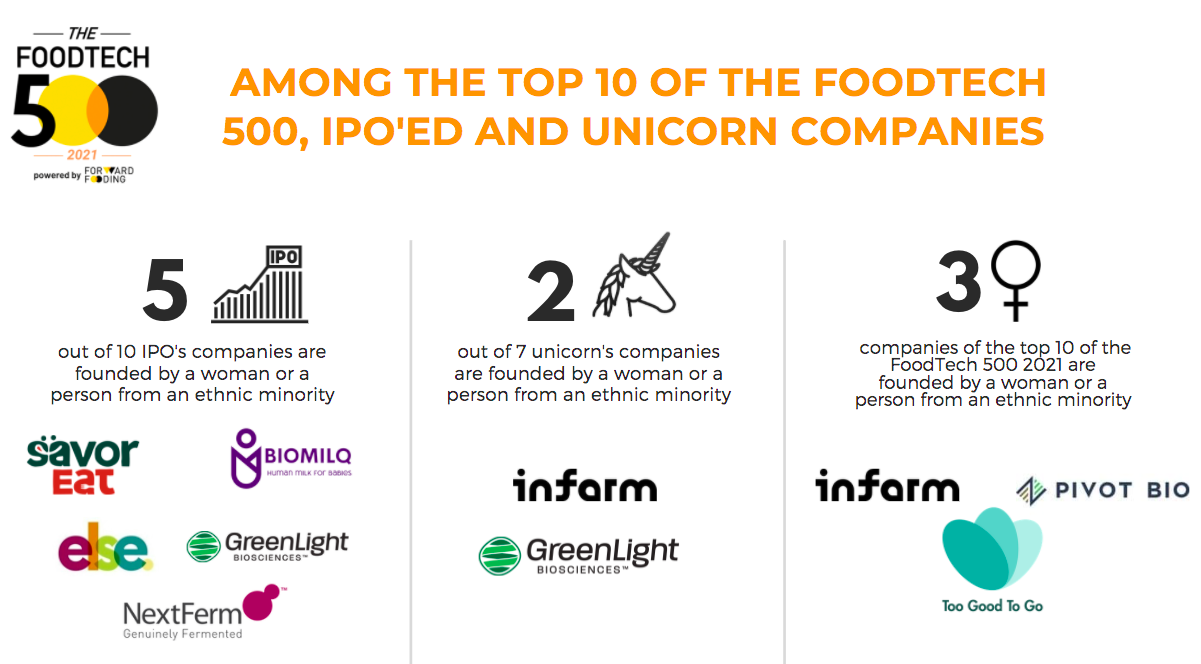
BIOMILQ AND CHINOVA FOUNDERS SHARE WITH US THEIR THOUGHTS ON DIVERSITY IN FOODTECH
Among the 2020 and 2021 FoodTech 500 editions, we found 82 companies from diverse founders’ teams ranking in both years’ lists. Here are some of their words of inspiration.
Natasha Dhayagude is the co-founder of Chinova Bioworks, a Canadian startup using the power of mushrooms to protect food and beverage products from spoilage. In the words of Natasha:
“Our team is 90% women in STEM. We aim to increase the representation and investment in support of women and gender non-conforming innovators as conference speakers, award winners and in positions of leadership, including boards and senior management.” Natasha Dhayague, Co-Founder & Ceo of Chinova Bioworks
Another 100% female-founded startup is Biomilq developing the next best alternative to breastfeeding through a novel technology culturing human milk cells outside the body. According to them, their perspective as women is valuable when it comes to refining their product:
“We always joke that as an organization of mothers and mostly female scientists and engineers we are the antithesis of the ‘men in black suits’ who usually lead infant formula business units at large companies. For us, a gut check on is it safe or how should we proceed scientifically is ‘would I feel comfortable with this choice if I were feeding this to my own child’.” Michelle Egger & Leila Strickland, Founders of Biomilq
WHAT ABOUT C-LEVEL MANAGEMENT?
Going beyond the composition of the founding teams, another crucial aspect of diversity in a company is represented by the C-level, namely the composition of the top-level management in a company. These executives are responsible for making the key strategic decisions affecting the business as a whole. Hence, the presence of women and minorities in these positions exponentially increases the inclusivity of the company and its impact on the outside world.
Finally, let’s not forget the crucial role of male CEOs in promoting diversity in their companies. In the words of Halim Jubran, CEO at Phytolon:
“The company supports gender equality, incorporation of minorities, and promoting deep-tech industry in the periphery. Phytolon included more women than men (including at C-level) and employees that represent minorities (including at C-level).”
With the support of male CEOs actively diversifying their C-level management, the closing of the gap becomes closer and closer.
ALTHOUGH WE STILL HAVE A LONG WAY TO GO, WE ARE HOPEFUL FOR WHAT’S YET TO COME
In conclusion, the road towards the representation of women and minorities in the AgriFoodTech startup space is still long but the stories and data we collected from the FoodTech 500 companies make us hopeful for the future of the sector.
There are increasingly encouraging signs: as recently reported by Agfunder, female-founded companies in AgriFoodTech have seen a steady increase from 9% in 2002 to 22% in 2020. In addition, we are also witnessing a growing representation in Venture Capital, with the emergence of actors such as ‘Black angels’ and female-led VCs working for a more inclusive agenda forward. To that matter, our friends at FoodHack just released an amazing list featuring 90+ women founders & investors currently disrupting the AgriFoodTech industry.
There are no doubts that this is a good thing for the sector overall, as Alessio D’Antino, Founder and CEO at Forward Fooding, highlights:
“It seems that the time for a change is now. Still, we’d like to peek into the future more than ever before. We believe in the importance of diversity – not only as an ethical principle but also from a business point of view. As stakeholders, decision-makers and educators, women and minorities have unique insights into real effective solutions to global challenges.”
Indeed, startups founded by inclusive teams, coming from diverse cultural backgrounds and walks of life, tend to address challenges with a more holistic view. To conclude, there’s no better way of saying it than in the words of Michelle Egger & Leila Strickland, Biomilq founders:
“We have hired a badass team of ladies (and a few allied gentlemen) that all believe deeply in our why. When this sector inevitably gets harder to operate in and requires resilient and motivated teams to overcome the hurdles ahead, we will be successful because our team believes in their bones that the work we do is world-changing. Female scientists innovate in this space for themselves and their future children – we are going to fight tooth and nail to bring products to market for our own family, friends, and world.” Michelle Egger & Leila Strickland, Founders of Biomilq
We hope that our work of giving a platform to the voices of outstanding diverse entrepreneurs and founders, here at Forward Fooding, will contribute to moving the needle on the issue and make the startup space more equitable and sustainable.
Forward Fooding is the world’s first collaborative platform for FoodTech Data Intelligence and Corporate Startup Collaboration. Contact us to know more!
Follow us
Sponsored Articles
9 July 2025
Forward Fooding celebrates the selection of 12 pioneering startups for the inaugural pladis Accelerator Programme. From water lily popcorn to sugar-converting enzymes, these innovations represent the future of snacking, addressing obesity, sustainability, and personalized nutrition through cutting-edge food technology.
21 March 2025
Tim Ingmire, VP of Global Innovation & Technology at pladis, discusses how the snacking giant is supporting early-stage startups in foodtech, health, and sustainability through their accelerator program. Learn about their focus on personalized nutrition, functional foods, and future ingredients to bring innovative, delicious products to consumers worldwide.
8 February 2024
Future Food-Tech returns to San Francisco on March 21-22 Over 1,700 food-tech leaders, from CPG brands, retailers, ingredient providers, [...]
1 February 2023
The 4th edition of FoodTech 500 is taking off and we are excited to partner with NEOM for the third consecutive year to support the best international AgriFoodTech entrepreneurs.
10 February 2022
One of the elements we enjoy the most here at Forward Fooding about working with AgriFoodTech startups is being [...]
